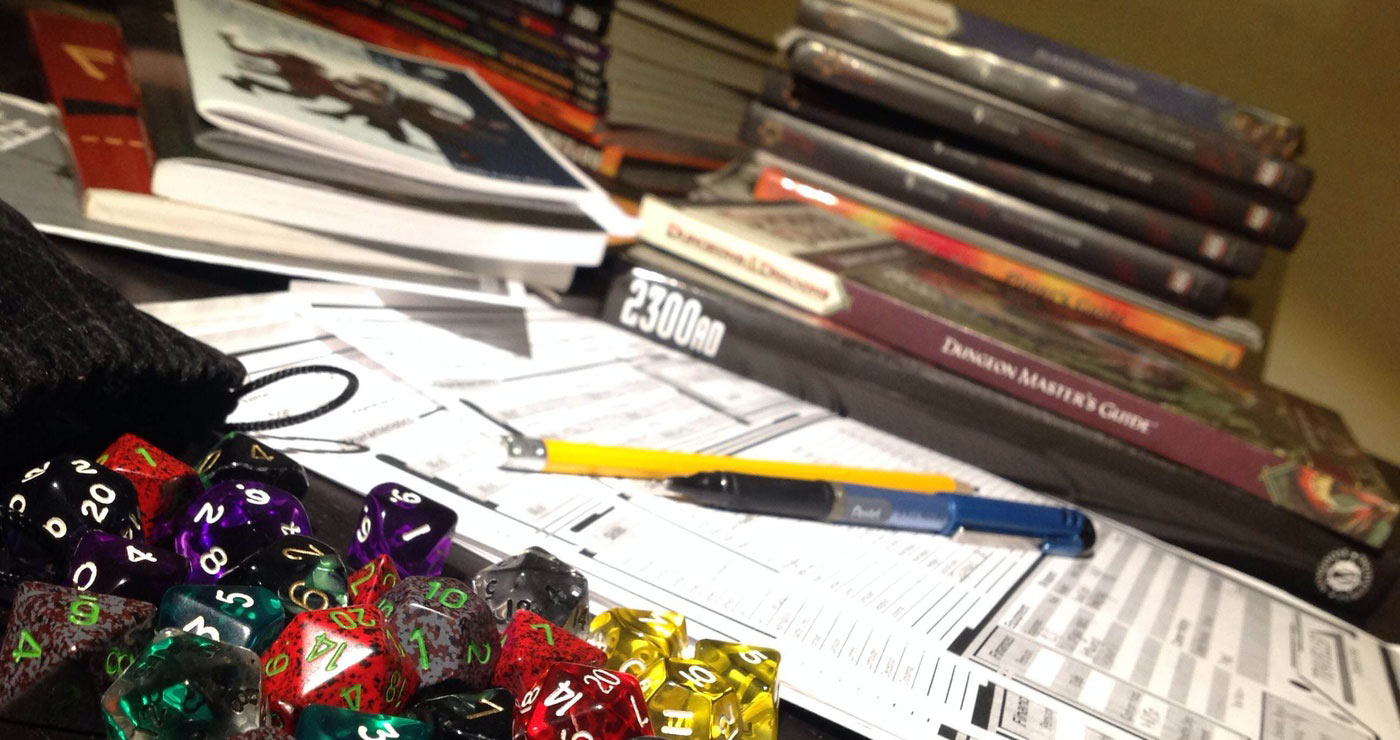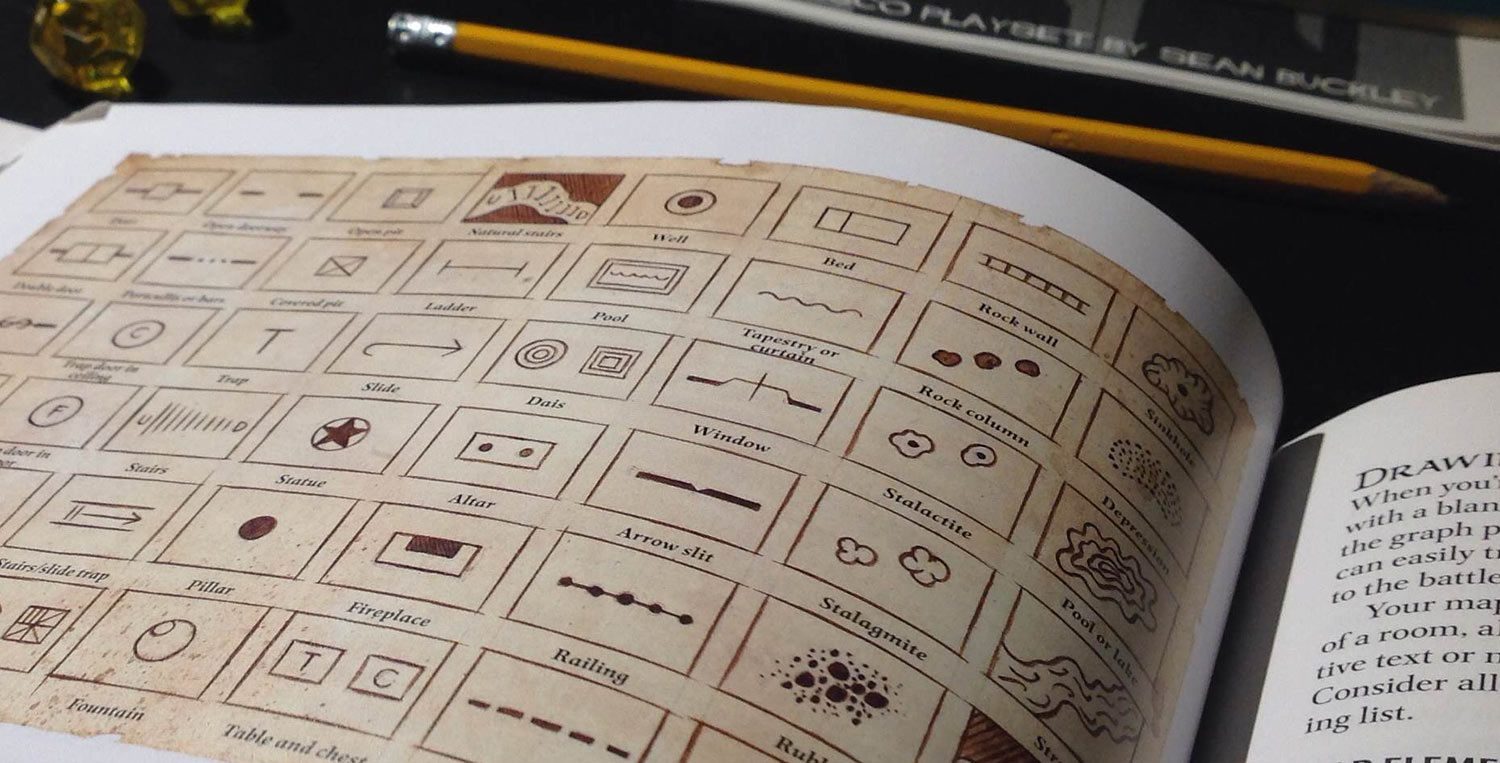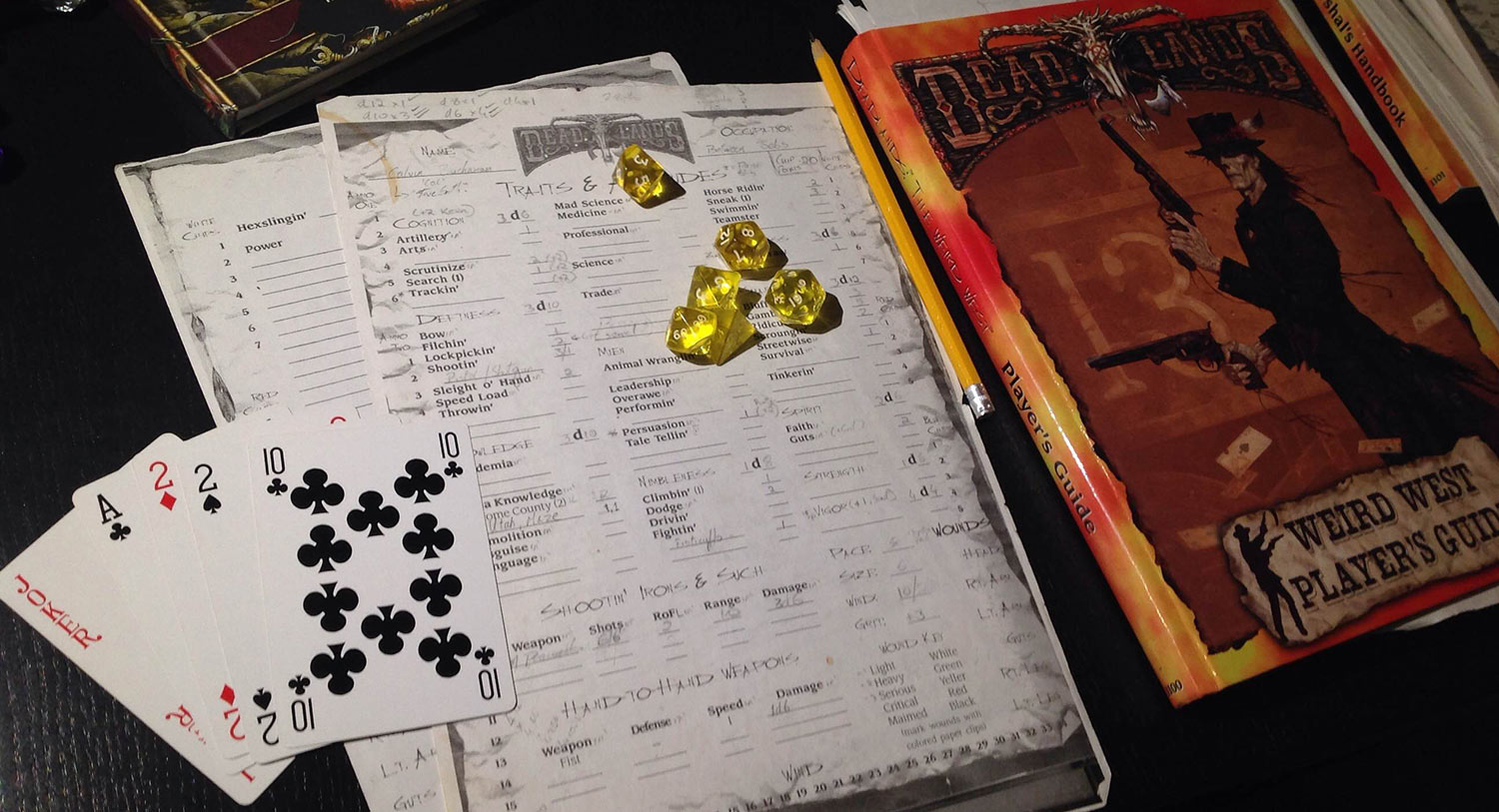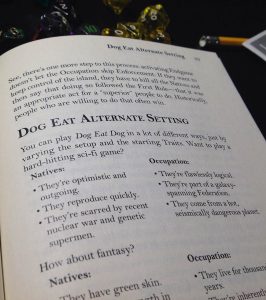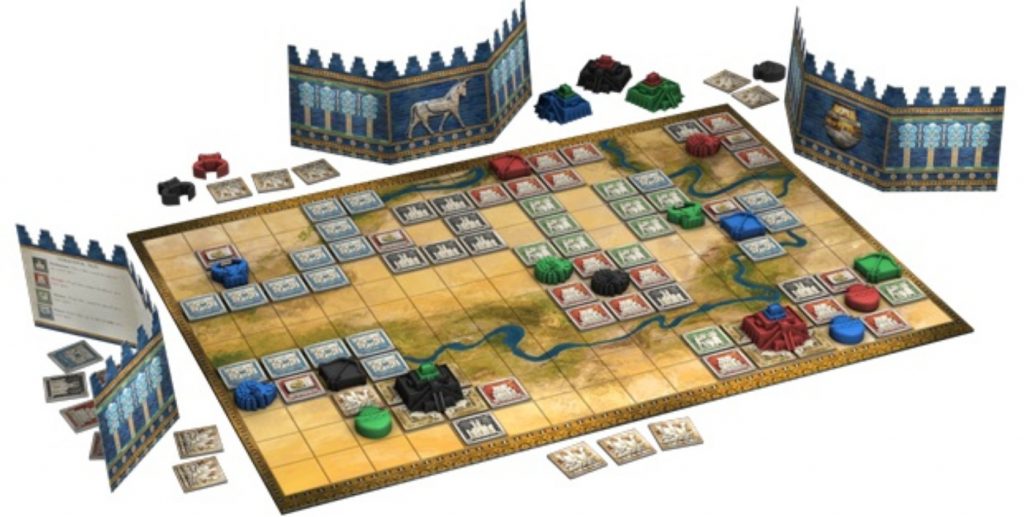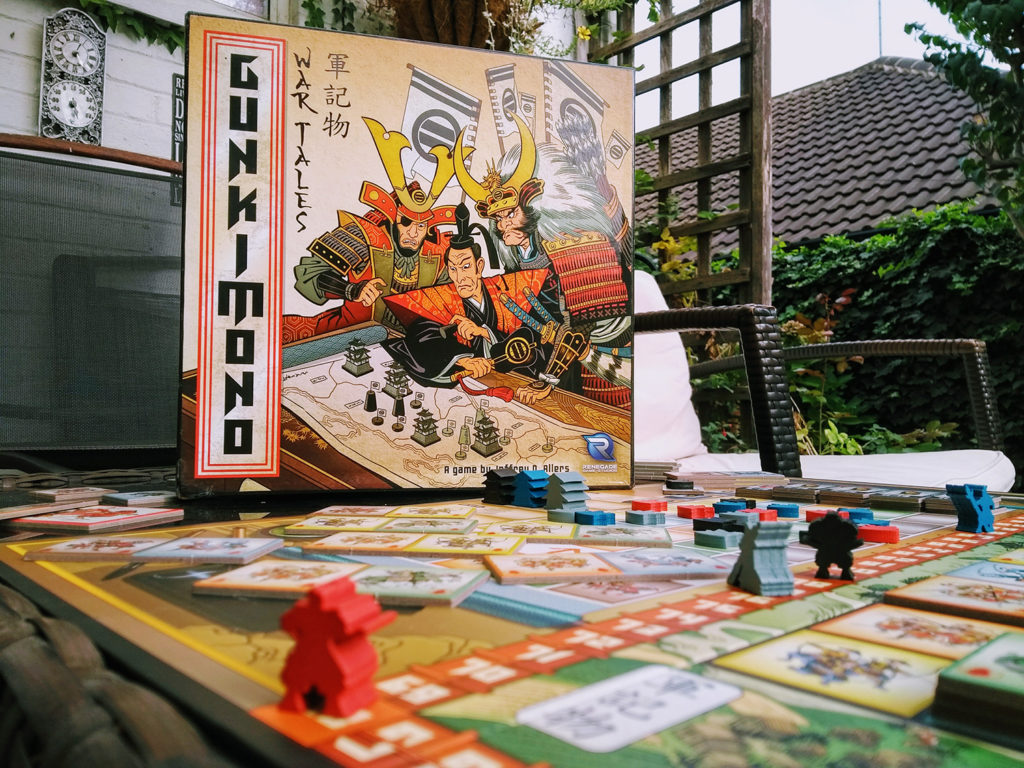Paul: Every year I make myself a new, sometimes private resolution and every year I do my best to see it through, but 2013 proved an exception. I told myself I’d try to design a tabletop roleplaying game and it wouldn’t matter if I was particularly successful or not, the point was to try and to learn from my mistakes. Then 2013 happened and I might as well have been Lear yelling at the storm. I was mostly wet and useless.
So I’m trying again and this time I’m going to write about it. Over the next few weeks I’m going to look back at games I’ve played and the systems I’ve played with, poke at mechanics that I have and haven’t liked and, most importantly, try and put some ideas together. Sometimes there will be some number crunching and design theory. Other times, there will be stories. Sometimes the two will meet and we’ll discover that dragons used to fly at five miles per hour.
So, let’s not delay. I want to start with a the story of how I was inspired to do this, over a year ago, then look at the sort of things I might want people doing in my game, then give a rough outline of what sort of game I’m going to fumble towards. Why not come with me and, I hope, not chuckle too much as I stumble my way through my thought process?
At the end of 2012 I was reading a book called Ill Met By Moonlight, the account of a World War II operation to sneak into Crete, capture a German general and then sneak out again. It’s typical of the patriotic war dramas that were published in the 1950s and it’s a true story. A small team of agents really did land on the island, put on disguises, ambush the general’s car, bosh his driver over the head and then run off with him into the hills. They wandered around for a bit, hiding in caves and eating their rations, before they rode a boat off the island. I think it’s fair to say they were a little bit crazy, a little bit lucky and ridiculously ambitious.
Doesn’t that sound like something you and your friends might have done in an evening or maybe across a short campaign? It’s the sort of utterly nuts adventure that isn’t so far removed from the kind we dive into when we roleplay, setting out against the odds, pouring over maps, carefully picking equipment and then leaping into action. This is the sort of adventure, I thought, that could easily be repurposed to a Pathfinder campaign. Or to Star Wars. Even, maybe Fiasco, or any of a host of things I’ve tried over the years.
Maybe.
You see, I started to think of how so many of the roleplaying systems I’ve played with would’ve been absolutely rubbish for representing some or all of the things that happened in this adventure. How, I asked myself, would I run an adventure like this? What sort of rules and mechanics would I need? What sort of game would I make if I could?
So I decided…
I’d like to make something pretty low-tech: I don’t think gadgets are necessarily very exciting, not in a roleplaying context, and I don’t want players solving too many problems by using technology. Distance is exciting. Travel is exciting. Hiding is exciting. Roughing it, bluffing your way around and fleeing into the hills when it goes wrong is exciting. Everything about Ill Met by Moonlight is pretty low-fi. A world where powerful technology is readily available, connects people and makes their lives a lot easier is a world where lots of problems are solved quickly or don’t even exist. Balls to that.
I want a framework that allows players to try lots of different things: This means having skills, skills like hiding, riding horses in exciting ways, walloping people and wearing hats (okay, disguises). The skills don’t necessarily have to be super-specific and nobody wants to get bogged down, but I do want players to be able to create distinct characters who are good at some things and bad at others.
I also want everyone to be able to try everything. That means no boundaries or exclusive class abilities, no wizards that can never wear armour or bounty hunters that can never use The Force. Let’s all of us give everything a go sometimes, not least because that allows things to go awry when we step out of our comfort zones.
Following that, I want things to go wrong sometimes (and for nobody to know when): This is vital. I absolutely have to have this. As a gamesmaster, the person at the head of the table pulling so many of the strings, I like to be surprised and not to know how everything is going to turn out. As a player, I like to take risks sometimes. As both, I like it when a sure thing actually fails, or when a long shot succeeds.
This means a mechanism to add randomness. I’m not sure I can handle this diceless nonsense that some of you are up to and, while I like the strange tangents that Fiasco can take, I want a risk to be a risk, not a decision by committee. This doesn’t have to mean dice, mind you.
Deadlands, for example, also has players drawing cards. Or how about flipping coins? The first edition of Warhammer Fantasy Roleplay had, among its many strange mechanics, Risk checks that gave players a 50/50 chance of outright success or failure. There’s a certain bald honesty to just saying that something is or isn’t going to work. It’s nothing if not uncomplicated.
I need quick things to feel quick: When you stop the General/Dragon Envoy/Sector Marshall/High Protector and drag them from their car/horse/grav wagon/privy, everyone needs to feel that sense of urgency, to believe that every moment counts and that they don’t have many of those moments. This means that not only does the game need to bounce along at a fair pace, without endless cross-checking of rules, but I also need significant things to happen in the space of a round or two.
Second Edition D&D used to say that a round was sixty seconds. Sixty seconds? Get lost. For many of us, that meant one spell or one thrust of a sword or one action. Sixty seconds is a really long time and if your gamesmaster rules that you need to bludgeon a bad guy into a zero hit point haze of unconsciousness, and they’re a general and so a high-level character with bloody dozens of hit points, suddenly you’re in a situation where you’re rolling dice over and over to whack someone for twenty minutes of game time until they’re totally prone. That’s a) stupid b) boring c) one of the many amazing situations that systems like D&D 2nd used to vomit-burp onto our tables.
Yes, that’s why we don’t play anything like it now, but do you see my point? Exciting things happen in a moment. That includes people collapsing, things exploding, spells gushing or disguises slipping. As well as quick skill checks, it suggests that we won’t all be running around with hundreds of hit points, absorbing blow after blow like self-propelled stress balls. Moments should matter, split-second decisions should be critical and both should have lasting consequences.
So, I want a roleplaying game that has skills and dice and pace, set in some sort of pseudohistorical setting. It’s going to have room for heists and capers and possibly terrible mistakes.
Great! Except that doesn’t sound all that far removed from anything else out there, does it? Well, maybe I’m not going to be doing anything revolutionary, but I know what I like.
There’s a couple of quick considerations I want to go over before I let you all return to your nachos.
Giving everyone the chance to try everything removes special classes: This means there are no D&D-style spellcasters, no Star Wars-style Jedi, no dedicated psionic warriors who have minds that work unlike anyone else’s. Playing something like this always meant you were committed to doing or not doing particular things, but I prefer the idea of a system that isn’t so rigid yet where players can still customise their characters enough that someone is clearly the sneaker, the fighter, the plumber. What does this mean for things like unearthly powers, magic or divine healing, if I want to include them? I’m not sure yet. I’ll have to come back to that, but maybe a Call of Cthulhu system of spells and skills is a place to start.
It’s a risky business: If characters can be knocked out in an instant, or if combat and risk-taking is quick and dangerous and has serious consequences, this means very bad things could happen to players with just the roll of a die. Players, particularly those up against the odds, need to be just a little bit tenacious, to have some sort of survivability, so that they can enjoy themselves. Do we give them more Hit Points to reflect this (ugh), high starting stats, or something like Luck or Fate points to spend to sidestep accidents?
Dice and numbers shouldn’t decide everything: I don’t mind a lot of stats and I don’t mind a lot of dice-rolling, but I appreciate that not everybody likes this. The Unknown Armies games I’ve played in always had us holding character sheets with less than a dozen skills and stats, players rolling only to decide the outcome of important things. Also, players want to feel in control and feel like they have cool and exciting characters, not that they have a barbarian or doctor who still fails to Tear Open Doors or Remove Tonsils 45% of the time.
So, I’ve written a lot here today, but not got very far yet. I’m going to go away and do a little bit of maths and, since I’m such a big fan of storytelling and decision-making, completely ignore that and look at some simple mechanics ideas instead. Next time: numbers! (Sort of.)

